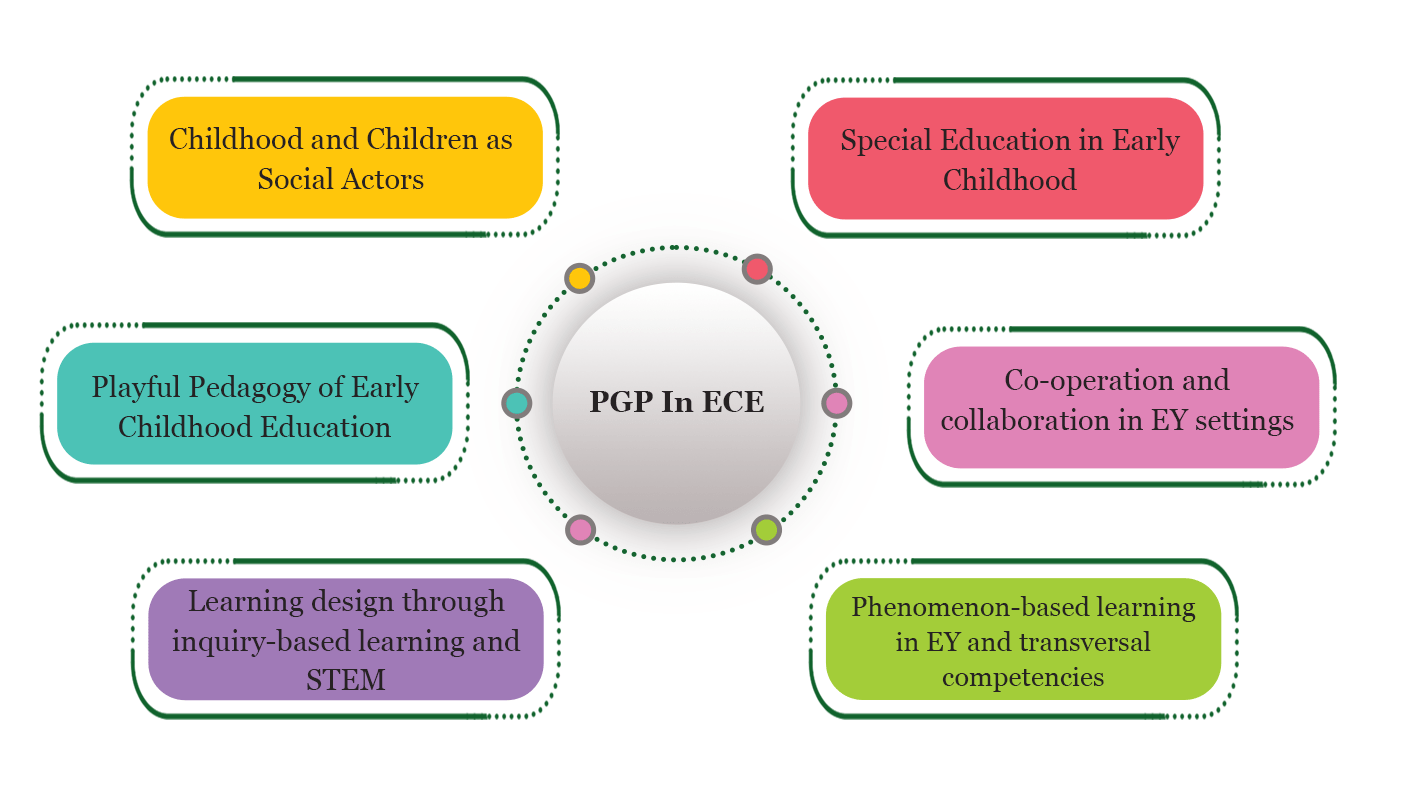Module ECE 001- Childhood and Children as Social Actors

In the module, you will become acquainted with the processes that shape childhood, families and society, and children's everyday lives (including children's media culture). This module focuses on global child policies, children’s participation in education, and how young children participate in and contribute to society.
You will build on your knowledge of children's development and the relation of social agency to the child's individual development and communities. You will deepen your understanding of the educational psychological theories surrounding the development and perspectives of childhood and gain pedagogical planning skills that build on observation of and interaction with children.
This
module also explores the foundational principles and innovative
practices shaping early childhood education today. It delves into
understanding the developmental needs of young learners, particularly
Generation Alpha and Beta, emphasising personalised and child-centered
approaches to foster active agency and participation. The programme
highlights the evolving role of educators in an age influenced by AI,
encouraging reflective practices, observation skills, and participatory
pedagogy to create enriched learning environments. Through a blend of
tactile, kinesthetics, and STEAM-based methodologies, you will explore
strategies to support children's active engagement and foster
collaborative learning. The module also connects these practices to
broader societal contexts, underscoring the importance of building
strong futures by empowering families and embracing the dynamic
interplay between childhood and society.
Learning Goals:
Consider early learning through the developmental point of view
Identify the child-centered approach to education
Recognise the different means of communication as an individual, shared, verbal and non-verbal processes
Understand how childhood is shaped and transformed in society
Understand the role of active and participatory learning in early childhood education
Recognise the key childhood politics at the practice level
Practice Outcomes:
Familiarisation with children’s opinions, everyday environment and life
Concept of learning and childhood in the 21st century
Explore children’s participation and agentic learning in ECE
Practice observation and interaction skills with children in ECE services
Get tools for supporting the communication in classroom
Facilitate the participation of children at the practical level
Introduction to the Postgraduate Diploma In Early Childhood Education 2026
Welcome to the Future of Early Childhood Education in the 21st Century!
In an era of rapid change, early childhood education must evolve to meet the needs of today’s learners. This programme invites you on a transformative journey that strengthens professional identity, deepens pedagogical expertise, and integrates research-based practices into early learning contexts.
You will explore essential 21st-century competencies, including social-emotional development, psychological well-being, and holistic learning. Through this, you will gain the skills to nurture these capacities in young children while refining your own teaching approaches and embracing emerging educational trends.
A key focus of the programme is understanding childhood and its complex developmental processes. You will study the interplay between children, families, society, and educational systems, enabling you to design meaningful learning experiences and support children as active contributors to their world.
The programme also emphasises playful and holistic learning. You will learn to observe and extend learning through play, and to create stimulating environments that support cognitive and socio-emotional growth.
By the end, you will feel confident in designing and assessing pedagogical plans aligned with national and local curricula and in stepping forward as an advocate for young children and the early childhood profession.
As we begin this teacher education programme centred on playful learning and teaching, we invite you to step into an innovative space where research, creativity, and meaningful practice intersect. Welcome to this in-service teacher training programme—a stepping stone towards a more playful, compassionate, and enlightened future in education.
Module ECE 004 - Playful Pedagogy of Early Childhood Education
In this module, the focus and aim is on pedagogy. The module explores the historical and theoretical starting points and basic concepts of the early childhood pedagogy, including the different levels of the curricula and pedagogical approaches. Also, the approaches of play and playful learning with multimodal pedagogical practices are examined. You will gain knowledge and professional skills to design, implement, observe, document, and evaluate classroom activities and plan assignments for high-quality learning in early childhood education. The special focus is on supporting children’s self-initiated learning through playful pedagogy. You will become familiar with the curricula and learn to develop, implement, and assess pedagogical plans. You will build on their professional identity as early childhood education pedagogues.
Play is examined as a cultural, developmental, and pedagogical phenomenon, and as a site of politics. You will become acquainted with different theories and playful environments, as well as narrative learning and the observation, planning, and guidance of the play. They will learn how to use play in different contexts of education and support children’s learning in playful ways. This module will include a practice period.
Learning Goals:
● Recognises the pedagogical frames of national and local ECE services
● Builds personal professional practices based on pedagogical models
● Understands the nature of play in early learning
● Learns methods for observing learning in play-based activities in class
● Is able to support learning through playful teaching methods
● Get tools for supporting and planning playful activities based on the curriculum
Practice Outcomes:
● Familiarize themselves with the concept of pedagogy as a teaching method and the professional competence of teachers in ECE
● Develop and plan their personal professional pedagogical skills
● Develop their professional curricular understanding
● Familiarize themselves with play and playful learning
● Get tools to use playful practices in class
● Explore and practice playful pedagogy
● Design a playful learning environment for local premises
● Learn methods for observing learning in play-based activities in class
